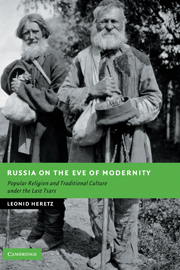Book contents
- Frontmatter
- Contents
- Acknowledgments
- Introduction
- 1 The traditional worldview
- 2 The Old Believers: modernization as apocalypse
- 3 The sectarians: dualism and secret history
- 4 Folk eschatology
- 5 The assassination of Alexander II (1881) and folk Tsarism
- 6 The year of famine and cholera (1891–1892): demonization of the nobility
- 7 The Japanese War: peasant Russia and the wider world
- 8 1905: revolution or reaction?
- 9 The Great War and the crisis of the traditional culture
- Epilogue
- Bibliography
- Index
- NEW STUDIES IN EUROPEAN HISTORY
8 - 1905: revolution or reaction?
Published online by Cambridge University Press: 23 December 2009
- Frontmatter
- Contents
- Acknowledgments
- Introduction
- 1 The traditional worldview
- 2 The Old Believers: modernization as apocalypse
- 3 The sectarians: dualism and secret history
- 4 Folk eschatology
- 5 The assassination of Alexander II (1881) and folk Tsarism
- 6 The year of famine and cholera (1891–1892): demonization of the nobility
- 7 The Japanese War: peasant Russia and the wider world
- 8 1905: revolution or reaction?
- 9 The Great War and the crisis of the traditional culture
- Epilogue
- Bibliography
- Index
- NEW STUDIES IN EUROPEAN HISTORY
Summary
The Revolution of 1905 opened a new era in Russian history, and is rightly seen as a decisive phase in the process which would bring down the old regime and result in the establishment of Soviet power. Although there is a broad scholarly consensus on the political effects of 1905, there is great debate on the causes. Roughly speaking, interpretations of the roots of the revolution divide according to the identification of the active force in bringing about upheaval, with one scholarly tendency focusing on the growth and organization of oppositional elements in the Russian educated elite, and the other perceiving an awakening and mobilization among the mass of the Russian people. In either case, the emphasis is on change, and continuity is neglected. The material presented in the following pages constitutes an attempt at enhancing the historical picture by highlighting the persistence of traditional modes of thought and behavior among the Russian peasantry and townsfolk in 1905. This will, in turn, support the notion that the revolutionary events of that year were primarily the work of active, organized elites and not the result of a broad popular movement.
It must be stated at the outset that no effort will be made to deny the fact of profound change in 1905, including in the popular milieu, and that any quantitative assessment (that is, one stating that 76 percent, another most, or another a third of the Russian people remained under the sway of tradition) is impossible.
- Type
- Chapter
- Information
- Russia on the Eve of ModernityPopular Religion and Traditional Culture under the Last Tsars, pp. 157 - 190Publisher: Cambridge University PressPrint publication year: 2008

